Connect virtually with high school students across the U.S., Middle East, and North Africa! Develop your civic engagement, leadership, and intercultural communications skills while learning how to implement a service project in your local community.
Certificate
Community Service
Leadership
Social Change
Designed to connect hundreds of young people across the United States with peers in the Middle East and North Africa (MENA) region, such as Algeria, Bahrain, Egypt, Iraq, Jordan, Kuwait, Lebanon, Libya, Morocco, Oman, Qatar, Saudi Arabia, Tunisia, United Arab Emirates, Palestinian Territories, and Yemen, The Experiment Digital Youth Leadership & Community Service prepares participants to be more civically engaged and lead change. This fully funded six-week summer virtual experience teaches high school students to formulate and implement service projects in their local communities.
Students come away from the program with:
The Experiment Digital, a pioneer in virtual exchange programming, launched in 2016. Our programs draw upon best practices in experiential learning accumulated over decades of Experiment programming. Originally launched to connect Experimenters with students in countries to which travel and traditional programs were not possible, The Experiment Digital Youth Leadership & Community Service is now providing a critical outlet for global intercultural exchange in a time of crisis.
Upon successful completion of the program, participants receive a Certificate of Completion in Leadership & Global Issues Analysis, access to the U.S. Department of State’s International Alumni Network, unique project funding opportunities from the U.S. Department of State, and a $400 scholarship for summer 2024 toward participation in one of The Experiment in International Living’s programs around the world.
Read and share our program flyer here.
PROGRAM DATES
APPLICATION DEADLINE
The Priority Admissions deadline is February 15, 2023. We will begin reviewing applications on a rolling basis after the priority admissions deadline on February 15, so students who submit applications by the February 15 deadline will receive an earlier admissions decision.
Please join our upcoming information session with our staff and recent alumni about the summer 2023 program!
The Experiment Digital Youth Leadership & Community Service retains The Experiment’s longstanding model of experiential learning and emphasis on forming meaningful relationships and moves it into the virtual space. Using popular digital platforms for teens like Canvas, Padlet, Flipgrid, and Zoom, our virtual program model gives young people the opportunity to build international friendships online. Peer-to-peer engagement, combined with carefully designed activities, allows students to learn from one another and develop knowledge and attitudes that foster cultural understanding.
Virtual exchanges diversify the learning experience through accessible digital means, enabling an increasing number of young people to enjoy a meaningful intercultural experience as part of their education.
Experiential Learning Online
Safe and Intimate Small Group Spaces
Program for Youth Led by Youth
Robust Curriculum to Prepare Future Digital Citizens
The Experiment Digital Youth Leadership & Community Service community is split into “Neighborhoods” of about 35 participants and are led by one Digital Peer Mentor and one Digital Community Facilitator. Within those neighborhoods are small groups of 8-10 participants called “Families.”
The Experiment Digital includes four modules, each of which is two weeks long and includes a variety of activities, discussions, and tasks—some completed independently and others in a team, with family, or neighborhood groups.
Module 1: Digital Citizenship
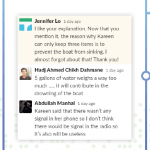 In this opening module, participants will introduce themselves to each other. To set the norms for online communications and ensure a productive space for the exchange, participants will discuss phrases and emojis that are polite and impolite to use in their cultures. They will also identify an issue that they care about in their communities and analyze its root causes.
In this opening module, participants will introduce themselves to each other. To set the norms for online communications and ensure a productive space for the exchange, participants will discuss phrases and emojis that are polite and impolite to use in their cultures. They will also identify an issue that they care about in their communities and analyze its root causes.
Module 2: Leadership and Identity
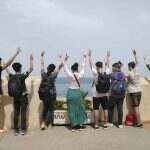 In this module, participants will formulate the issue they want to address in their communities into a problem statement that begins with, “How might we…” to narrow the scope of their projects. They will also engage in a collaborative problem-solving activity, where together as a group they will have to reach an agreement within a given timeframe while practicing leadership skills.
In this module, participants will formulate the issue they want to address in their communities into a problem statement that begins with, “How might we…” to narrow the scope of their projects. They will also engage in a collaborative problem-solving activity, where together as a group they will have to reach an agreement within a given timeframe while practicing leadership skills.
Module 3: Community Initiatives
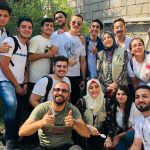 Participants will take the problem statements they devised in the previous module, and collaboratively brainstorm solutions together. Sometimes, it is helpful to learn how trash is recycled in Erbil, Iraq, and brainstorm how that may be applied to Washington, DC. In this module, participants will also share in small group dialogues how gender norms and societal expectations affect their lives.
Participants will take the problem statements they devised in the previous module, and collaboratively brainstorm solutions together. Sometimes, it is helpful to learn how trash is recycled in Erbil, Iraq, and brainstorm how that may be applied to Washington, DC. In this module, participants will also share in small group dialogues how gender norms and societal expectations affect their lives.
Module 4: Public Narrative
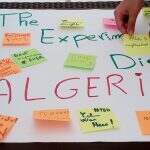 In this closing module, participants will take everything they have developed for their projects and put it into an action plan. Many of our program alumni implement their action plans in their communities post-exchange and have received grant funding to sustain their initiatives. Participants will also learn the public narrative framework on how to tell a story about themselves—why they came to this exchange program, and what their responsibilities are, as alumni of The Experiment Digital Youth Leadership & Community Service.
In this closing module, participants will take everything they have developed for their projects and put it into an action plan. Many of our program alumni implement their action plans in their communities post-exchange and have received grant funding to sustain their initiatives. Participants will also learn the public narrative framework on how to tell a story about themselves—why they came to this exchange program, and what their responsibilities are, as alumni of The Experiment Digital Youth Leadership & Community Service.Anytime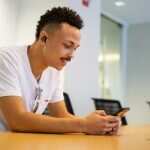
Saturday, 3PM (Example)
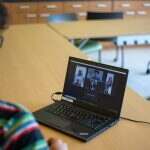
Sunday, 1PM (Example)
You are eligible to apply if you:
*Internet support may be available upon request.
What do I get from completing the program?
How do I become a digital facilitator?
When does The Experiment Digital take place?
How do you select your students?
The Experiment Digital Youth Leadership & Community Service is supported by the Stevens Initiative, which is sponsored by the U.S. Department of State, with funding provided by the U.S. Government, and is administered by the Aspen Institute.

I think that our responsibility in this increasingly globalized, yet divided world is to make it less divided by making people connect more. We can use the skills we learned from experience to make people see how easy it is to connect with each other despite the borders that separate us. I believe that we are all connected on certain levels that can’t be touched by segregation. I didn’t think that it would be possible to get along with people from different countries and backgrounds, but here I am, a month later, thinking how easy this whole process was.
TALA, The Experiment Digital alum, Iraq
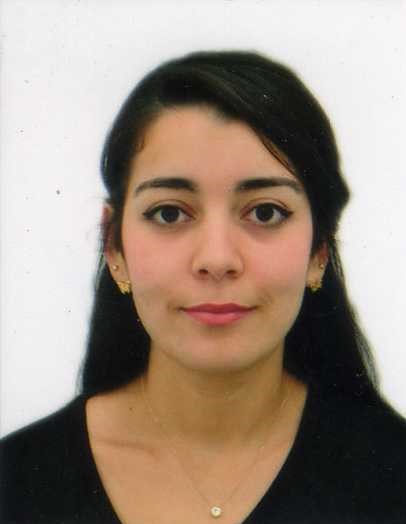
Djamila is a 2019 digital facilitator and master’s student from Algeria. Prior to serving as a facilitator, Djamila was a mentee in the Maharat Mentorship program with World Learning. She also serves as a communication manager for a community project that aims to help university students who live far from their homes during the school year to eat healthier and save more money.
“I believe that one thing I gained from being a part of the program is the people whom I had the chance to meet. In one way or another, they all left an impact on me. Some taught me lessons and gave me guidance; some inspired me and some I even learnt from their mistakes. By the end of the program, I found myself having a whole new group of friends from different countries and backgrounds with whom I am still in touch with today.”
1015 15th Street NW, Washington, DC 20005
PO Box 676, 1 Kipling Road Brattleboro, VT 05302
P: U.S. 1.800.345.2929 | Intl. +1.802.258.3481
F: 802.258.3427